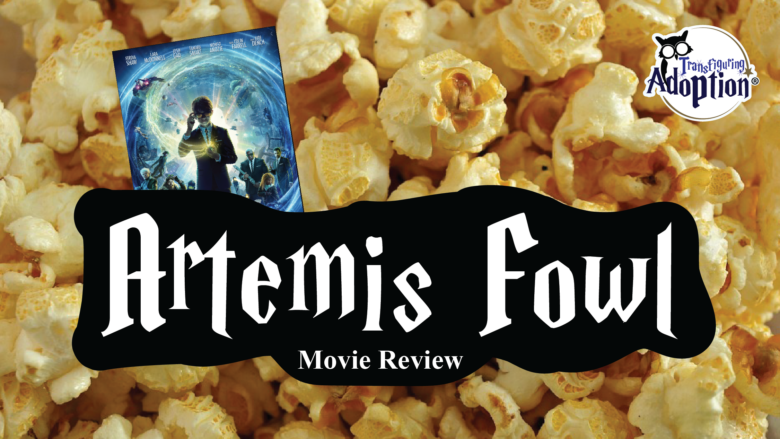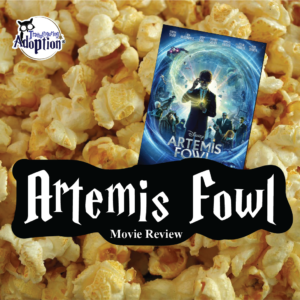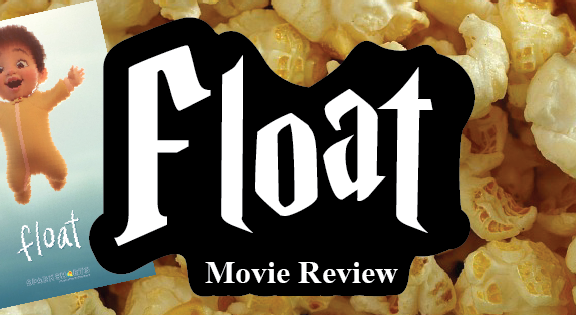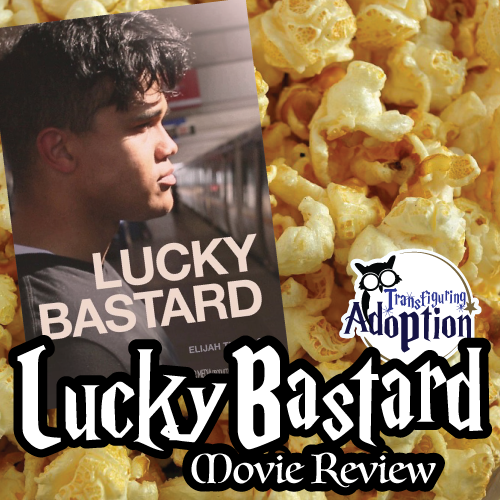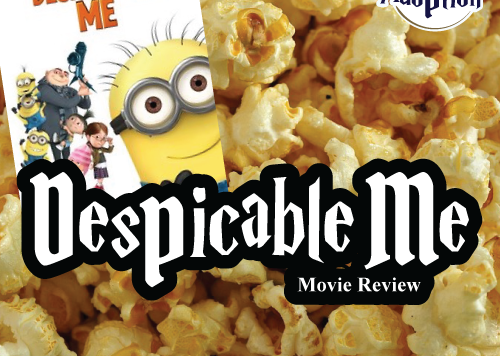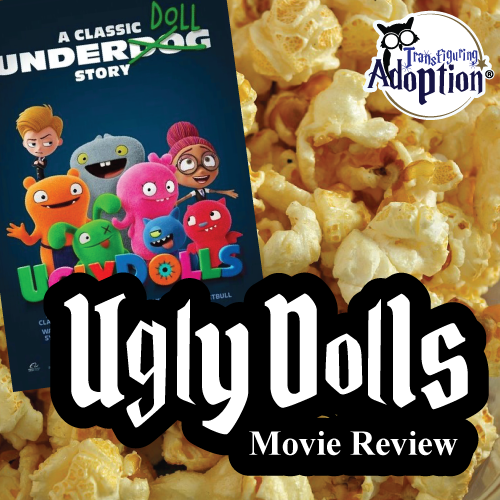Grade:
Transfiguring Adoption awarded this movie 3 Hoots out of 5 based on how useful it will be for a foster/adoptive family. [Learn more about our Hoot grading system here]
Movie Info:
- Rating: PG (for fantasy action/peril and some rude humor)
- Genre: Action & Adventure, Kids & Family
- Runtime: 95 minutes
- Studio: Disney+
From the cover of Artemis Fowl (2020) by Disney+:
“Based on the first two books in author Eoin Colfer wildly popular children’s fantasy series, Walt Disney Studios’ Artemis Fowl tells the story of adolescent criminal genius Artemis, who captures a vicious fairy, and attempts to harness her magical powers in a bid to rescue his family.”
Transfiguring Adoption’s Overview:
Before I jump into my review of Artemis Fowl (2020) I do want to make the observation that this movie has very little to do with the book series of the same name. This movie has taken several deviations from the original books series so I actually am more likely to recommend this series to families with foster and adoptive children for this reason.
I’m sure someone was surprised by that so I will clarify. In the book series, Artemis Fowl II is a pretty solid example of an antihero, meaning that Artemis at times may have done things that were heroic/good but typically not for heroic/good reasons. Think about a young PG version of Marvel’s Deadpool or DC’s Harley Quinn and you can get an idea about the moral distinction from a traditional superhero. The story in this film though has altered enough in plot though where Artemis’ motivations and actions are easier to explore with children who have endured trauma. There are a few points caregivers still should be prepared to discuss but overall this film was less problematic than I originally expected (as someone that read some of the books in the early 2000s).
Artemis Fowl (2020) is indeed a neat fantasy/sci-fi experience appropriate for families with children and youth ages 10 and up. I would recommend 10 and up specifically because younger children may not be able to follow the plot well and may not enjoy the film as much as an older audience.
** Spoilers Could Be Ahead **
How Is This Relevant To Adoption & Foster Care?
Artemis Fowl (2020) does not directly deal with the child welfare system, but does feature two main characters who have lost a parent. We find at the start of the film that Artemis’ mother passed away prior to the events of the film. Additionally, Artemis’ father goes missing at the start of the film and Artemis finds himself wrestling with accusations of his father being a thief and criminal. Fairy Holly Short’s father, Birchwood Short, passes away under mysterious circumstances while working reconnaissance for LEPrecon. Both characters find themselves dealing with their emotions related to these losses throughout the film and trying to uncover what truly happened to their fathers. Children from the child welfare system only know a piece of what brought them out of the custody of their biological parents and, especially as they grow older, like Holly, are going to have questions about the past. Having kind, caring adults in their lives is essential for children who have been removed from the biological home and helping them traverse these questions and the emotions that may accompany the answers they receive. For this reason we can look at the interactions between Artemis and Domovoi (called “Dom” throughout the film) and Holly and Commander Root, who function as mentors and guardians while the two are without parents.
Discussion Points:
- Building Trust
At the start of the film it is clear that Artemis does not trust adults to be competent enough to care for him and his unique needs. Artemis is portrayed as defiant and a know-it-all who believes he is smarter than adults around him (such as his therapist). When asked who he respected, Artemis could only list figures who were no longer living such as Albert Einstein. Much like Artemis, children from the child welfare system have developed ways to cope without stable adults nearby and often do not see adults as a source of safety. If a child cannot feel safe, they will be unable to trust adults and therefore lack respect for adults. In reality, Artemis shows a great deal of respect for a couple of adults in the film (i.e. – Dom, his father, etc.) but these are all adults who have taken the time to work through questions and talk to Artemis even when Artemis pushes them away by lashing out. In the same way, the kids in our lives need someone who’s going to weather through the behaviors meant to push away and isolate and continue to “show up” to break that preconception of adults and change the way that child views trust and relationships. - Meeting a Child’s Needs While Processing Hard Things
I’m going to be honest, the opening scene with Dr. Po (the school Psychologist for Saint Bartleby’s School for Young Gentlemen) made me cringe big time. I’m not entirely sure why Dr. Po seemed so intent on flooding Artemis with a reminder of every traumatic thing that happened to him and thinking that was going to garner cooperation. Though Artemis is very intelligent he still needed a strong, caring adult who would be willing to allow him to talk at his own speed. Rather than identifying Artemis’ behavior as a communication of need for competency, Dr. Po seemed to be feeding into the conflict. This is a very common issue in processing trauma with children from the child welfare system. Adults often come into the lives of children and youth of the child welfare system wanting to help but grow very offended when children and youth are not eager for this help. If a caregiver wishes to bring lasting change for a child or youth in their care, they very much need to be prepared for the push back and to change the game plan while following the child or youth’s need. It is not clear how long the therapeutic relationship has developed between Dr. Po and Artemis but it is clear that Artemis was not interested in the slightest by another adult who did not understand him or wanted blind compliance. Caregivers who are flexible in their expectations for a child in mourning and in ways to provide support for a child are more likely to be successful in developing good rapport and lasting change in behaviors by following the child’s needs and only taking charge when absolutely necessary. - Caregiver/Child Boundaries
One critique I have for films such as Artemis Fowl (2020) is how often a conflict can only be solved by a child and how incompetent adults can appear throughout the experience. This can often reinforce the belief a child or youth has developed that they are alone and unable to trust the adults around them. There was some redemption in this particular film in this case as Artemis Fowl I and Dom are mostly shown as competent and it was explicitly stated in the film that Artemis Fowl I did not intend on passing the torch to Artemis Fowl II in his activities until he was much older. It was also positive to see though Artemis was making a lot of decisions, Dom was still very much in a guardian role and offering physical protection and being mindful that though Artemis may have intelligence of a youth much older than his chronological age, Artemis was still a youth who had needs that match his actual age for safety and security. This is another area in which caregivers often struggle as children and youth in custody in some ways may acting younger or older than their stated ages… often in different areas at the same time! Caregivers need to be prepared to be flexible with expectations of a child’s behavior so they can meet a child’s need while being respectful of a child’s chronological age (as to not be dismissive and demeaning of very valid needs).
Cautionary Points:
- Separation from Birth Parent
Any level of separation from a primary attachment is highly traumatic to a child, especially when separation has become permanent from incarceration of a parent, death of a parent, or the severing of parental rights legally. For this reason, a caregiver needs to be very cautious in allowing a child who struggles with grief and loss in viewing this film as Artemis is portrayed with a deceased mother and a father who has been abducted and in mortal peril. Holly’s parents are also deceased in the film. These significant losses, in addition to Dom’s close encounter with death as a primary caregiver, may be triggering for children with similar losses. - Fantasy Violence
Throughout the film children or child-like fairy folk are depicted using fantasy weapons (i.e. – guns, swords, etc.) against humans and humanoid creatures. There are also two encounters with a dangerous Troll that attempts to kill innocent characters while enraged. The villain of the film, Opal, is consistently violent against Artemis Fowl I and threatens to kill him directly to his son, Artemis Fowl II. Artemis and Juliette are frequently in harms way as is child-like Fairy Holly. Blood and dismemberment is not graphically shown so this would be a low level of concern but may be troubling for some children who struggle with any depiction of violence. - Youth Shown Engaging in Risky Behavior
Artemis, Juliette, and Holly are frequently in the middle of tense negotiations with adults to save Artemis’ father and some battle scenes. Holly several times puts herself in harms way trying to protect others. - Minor Crude Humor
Mulch is shown opening his jaw in an abnormal/gross way. It is also implied (and briefly shown) that when he tunnels in the ground the earth he eats comes out of his backside rapidly. His bright colored underwear is shown briefly while he demonstrates this. Parents with children fixated on potty humor may need to be aware of this if they have a child who may emulate dropping pants and eating dirt like Mulch. - Incompetent Adults Depicted
Though the adults themselves are not unintelligent and meaning to be incompetent, Artemis consistently outsmarts the adults around him whether friend or foe. Artemis also is permitted some level of authority over Dom, though Dom is functioning as a guardian following the abduction of Artemis II. This concept can be problematic for children and youth who struggle with trusting adults to care for them as this can reinforce feelings that adults will not be able to fulfill their needs for felt safety. - Acts of Criminality
Artemis’ father is accused of being a criminal and thief. The behavior is later justified as Artemis I is trying to protect both the human and fairy worlds but this still is justifying stealing. Mulch also is portrayed as a criminal, even seen in a jail cell and in handcuffs, and takes part in criminal acts (i.e. – breaking and entering, stealing, etc.) as well on behalf of Artemis II and Commander Root. By the end of the film as well Artemis II is being referred to as a “Criminal Mastermind”. - Ship Wreck
An unnamed fisherman during the course of the film is nearly harmed by his ship wrecking as a result of LEPrecon placing a time freeze around the Fowl Estate and pushing the water into tsunami-like waves. Holly is able to swoop in and save the fisherman, but the dangerous waters may be triggering for children or youth who have had traumatic experiences with water. The same could be said for a volcano being used as a high-risk elevator but this is less likely as characters are not harmed by the use of the volcano as a high-speed elevator.
NOTE: Inclusion on these lists does not necessarily mean endorsement. Furthermore, with all our resources, we highly recommend you preview them first to determine if there are any trauma triggers that your child may not be ready to handle. Transfiguring Adoption does not intend for its reviewers nor its reviews to be professional, medical or legal advice. These reviews and discussion guides are intended to help parents to better be able to connect and understand their children who come from traumatic backgrounds.
